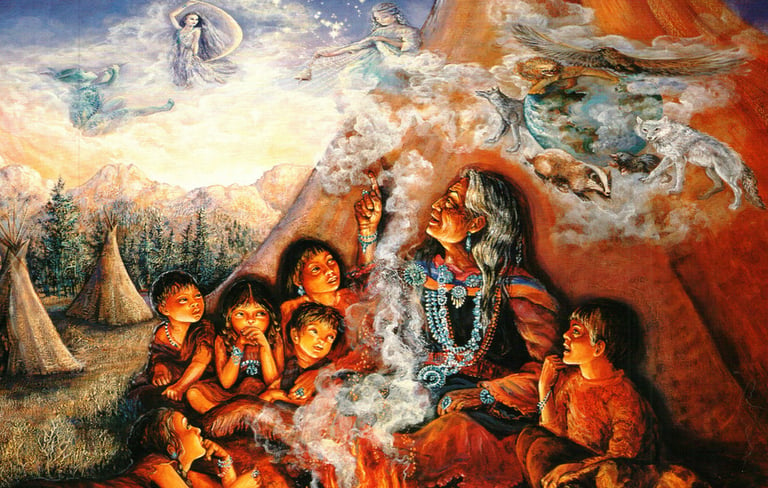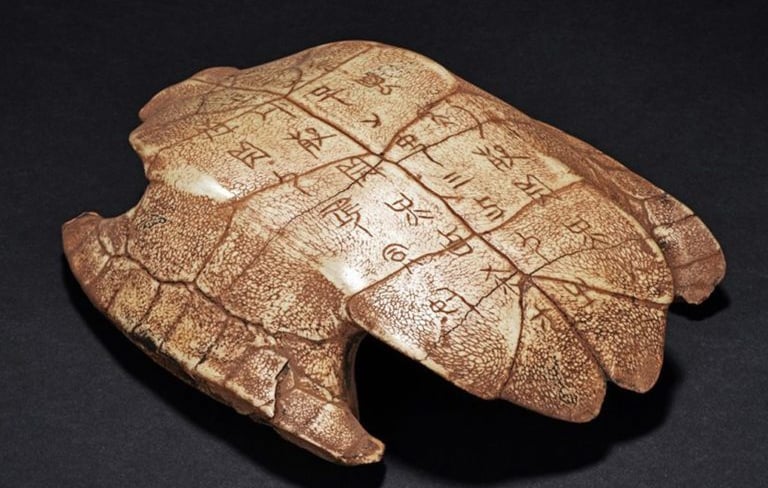Chinese Classics
Exploring the development of Chinese philosophy by examining its essential texts and scientific evaluations of archeological data.
Chinese culture has a continuing legacy of more than 5000 years, among which at least three thousand years can be traced through numerous ancient texts that document the rich history and traditions of this great civilization. The existed system of characters was established more than 3000 years ago, and has been preserved in Oracle bones of the Shang dynasty, through which we can learn the foundations of Chinese culture and the evolution of its written language. More importantly, is that these practices were developed during the Zhou dynasty, which marked a significant turning point in Chinese history, and were further refined in a classic text known as the Book of Changes, highly praised by Confucius, who regarded it as one of the paramount works of wisdom. Its classic text was formed not later than 2500 years before present, showcasing ancient Chinese philosophical thoughts and their understanding of the cosmos. Along with other classical texts such as "Great Learning", "Dao De Jing", and many others, this collective body of work provides invaluable insights that give us a unique opportunity to trace the evolution of human thought from primordial states to the complex philosophical ideas that later influenced various aspects of life, governance, and spirituality. This is a unique body of knowledge that is critical to investigate the future way of human evolution, offering profound lessons that remain relevant even in our modern context, encouraging a more reflective and enriched perspective of our development as a society.
Kanaev Ilya A., Dryaeva Ella D.
Inheritance between Generations, Magic and Institutions of Power in Early China.
Voprosy Filosofii. 2023, 3, 132-144.


It is foreseen that the emergence of culture has been a key factor in human evolutionary success. However, the richness of cultural forms and significant differences between national cultures complicates the demarcation of cultural practices and natural behavior. This leads to a blurring of the concept of culture and makes possible speculations on the concept of human nature under the slogans of returning to the natural state of human beings and canceling artificial restrictions. Therefore, a clear understanding of the evolutionary continuity of the human species along with the demarcation of human consciousness and self-identity from their evolutionary predecessors is needed. The authors of this article continue the interdisciplinary study of consciousness and combine it with data from anthropology, history, and philosophy of the Chinese culture, which has been able to maintain uninterrupted continuity for more than three millennia. The most ancient magical practices of the Shang dynasty demonstrate a direct connection with some forms of prehistoric behavior, in which one should look for the foundations of the culture. Merging magic and state institutions under the leadership of the Shang clan caused the transformation of a mystical worldview into a system of more abstract philosophical concepts. The consequent development of this system in classical canons of the Zhou dynasty became the basis for the formation of the philosophy of the Changes, which reflects the most fundamental principles of the Chinese culture. This research allows us to consider the historical development of culture on a concrete example and question the essence and future of human development.
Great Learning
Translation of Chinese classics
《大学》
The Chinese Classics 《大学》 stands out as one of the key texts within Confucianism. The opening section is attributed to Confucius, with subsequent commentaries contributed by his disciples, elucidating the ideas within. This text embodies the core principles of what it means to be human. It laid the groundwork for Chinese culture and civilization, facilitating the preservation and accumulation of knowledge. This represents an invaluable treasure that Chinese culture offers for the collective future of humanity, which is essential to understand amidst today's global transformations.
The following is the translation from the original Chinese text done by Kanaev Ilya. It was initially published in AHCI journals and subsequently reprinted in a number of monographs on Chinese classics, available in both Russian and English.
大学之道,在明明德,在亲民,在止于至善。
知止而后有定,定而后能静,静而后能安,安而后能虑,虑而后能得。
物有本末,事有终始,知所先后,则近道矣。
古之欲明明德于天下者,先治其国;欲治其国者,先齐其家;欲齐其家者,先修其身;欲修其身者,先正其心;欲正其心者,先诚其意;欲诚其意者,先致其知,致知在格物。物格而后知至,知至而后意诚,意诚而后心正,心正而后身修,身修而后家齐,家齐而后国治,国治而后天下平。
自天子以至于庶人,壹是皆以修身为本。其本乱而末治者否矣,其所厚者薄,而其所薄者厚,未之有也!此谓知本,此谓知之至也。


The Way of the Great Man’s learning is to illuminate and spread the Order, to unite the people, and to uphold the highest excellence.
When one is firmly established at the height of excellence, one attains knowledge and becomes steadfast, no longer confused in one’s own states of being. The one who discerns the distinctions of their states can remain calm. The one who is calm can be at peace with themselves and with the world. The one who is at peace can care for others. The one who cares for others can fulfill the aim of their Way. Things have roots and branches; affairs have beginnings and ends. To know the order of what comes first and what follows—this is the approach to the Way.
The one who sincerely strives to illuminate and spread the Order throughout the Land begins with governing their own country. The one who would govern their country must first regulate their household. The one who would regulate their household must first cultivate their body and mind. The one who would cultivate their body and mind must first make their heart upright. The one who would make their heart upright must first attain sincerity in their states of being. The one who would be sincere in their states of being must first extend their knowledge. The extension of knowledge lies in the investigation of things. When things are investigated, knowledge is complete. When knowledge is complete, one’s states of being are sincere. When one’s states are sincere, one’s heart is upright. When one’s heart is upright, the body and mind are cultivated. When the body and mind are cultivated, the household is regulated. When the household is regulated, the country is governed. When the country is governed, there is peace throughout the Land.
The common foundation for all—from the Keeper of Haeavens to the most ordinary man—is the cultivation of body and mind. Never has it been the case that when the root is corrupted, the branches may still flourish and be well ordered. Nor can it be that what is great and important is neglected, while what is trivial and insignificant is prized. This is knowledge of the foundation. This is the utmost knowledge.
Kanaev Ilya A.
The origination of the Book of Changes.
Voprosy Filosofii, 2020, 7, 176-190.


The article continues the author’s research of the Chinese classical philosophy from the position of the modern epistemology and explores the emergence of the Book of Changes. The study starts from the historical myth about the fate of the Xia and Shang dynasties and the innovations introduced by the founders of the Zhou dynasty to the moral principles of cognition methods. The first task was to limit the arbitrariness of the ruler and coordinate their actions with the will of the people and Heaven. On the base of the epistemology’s recent achievements, the author illuminates the fundamental inefficiency of abstract moral instructions, which cannot be even noticed by the one whose will is not coherent with them. Hence, the predetermination of the cognition way is the only way to guide human behavior. The author puts forward the hypothesis that the origination of the system of Changes was a response to this particular challenge. The analysis of the oracle bones that was the official cognition practice during the Shang dynasty reveals its general mode as a “subject-object” interaction and thus confirms the given historical myth. On the base of the recent archaeological finds and comparative analysis of the cognition practices, the author presents arguments in favor of the fundamental role of hexagrams in the system of Changes and their direct origin from the previous method of the oracle bones divination. In the course of the historical development, the cognition practices had come to establish equality between the subject of cognition and the surrounding reality. The system of the Changes provides a particular method of cognition that prescribes human being to look for the actions, which are coherent with the world they are living in. Such an interaction follows the “subject-subject” mode and opens the possibility for a human being to become a real agent of action and change the world through their labor.
Address
Shandong University,
Advanced Institute for Confucian Studies
1801
Contacts
+86-13902409939
Messengers | Phone
